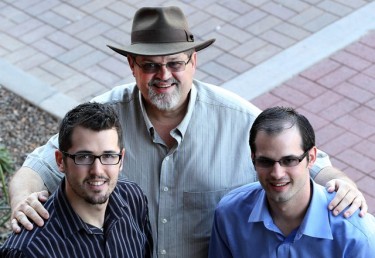By Doug Carroll
GCU News Bureau
The memory of Sept. 11, 2001, brings tears to the eyes of GCU instructor Chip Lamca — and for reasons you wouldn’t suspect.
To many, the world never seemed more fractured than it did on that fateful day, when terrorist attacks on New York City and Washington, D.C., struck lasting blows to the American psyche.
To Lamca, the tragedy revealed the very best of the human spirit in a land where he had lived for only a year: Peru. He had moved to the South American country with his wife, Julie, and their four children, then ages 12, 10, 5 and 4, selling everything they owned to become missionaries.
Lamca, a pastor in Pennsylvania and then Florida, arrived in Peru knowing the Spanish words for “yes,” “no” and “French fries.” Asked about the birthplace of Jesus by a 5-year-old, he translated “Bethlehem” as “House of Bread” — the Hebrew meaning — because he couldn’t come up with anything better. (That’s how certain Peruvian children grew up thinking the Christ child entered the world in a bakery.)
Those awkward beginnings mattered little to the native people, however, when 9/11 hit and a gringo was in their midst, needing support.
'Peruvians don't forget'
“Even six months later, people extended their hand and said they were with me and they understood,” says Lamca, 48, still deeply touched by the empathy of strangers. “It happened three or four times a week. That’s still huge with me. They knew the sting of terrorism.
“Peruvians don’t forget. They are an amazing people…. There’s a realness about them. They tell you what they think, but they’re very gracious.”
Although the Lamcas returned to the United States to live in 2008, they go back to Peru — and to the north coast city of Trujillo — each summer, hosting GCU students during their stay. Last summer, a group of 10 helped put on a “life fair” in Trujillo’s Miguel Grau neighborhood, providing wellness checks, health and beauty tips, haircuts and family portraits for residents.
Trujillo, Peru ● Founded:1534.● History:Considered the cultural capital of Peru, though much smaller than the capital city, Lima (10 million).● Population: 1.5 million. ● Climate: Mild and warm, with a year-round temperature range of lows in the upper 50s to highs in the upper 70s.
● For more on the Lamcas’ work: www.crossthefrontier.com.
The community consists of working-class people of modest means, many of them employed by the shoemaking industry.
“Peru doesn’t have nearly the physical need it had 11 or 12 years ago,” Lamca says, noting a booming economy in gas, copper and gold. “There’s a middle class for almost the first time. But the spiritual need is probably bigger (than before). There comes an understanding that (material) things don’t fill up the empty space in a person. There’s still something missing.”
Most Peruvians identify at least culturally as Roman Catholic. But the evangelical Christian population is growing and now consists of about 10 percent in Trujillo, an arid city of 1.5 million people that receives little more than a half-inch of rain annually.
“Phoenix is like a jungle by comparison,” says Lamca, whose ministry to the region began with drilling water wells up and down Peru’s north coast.
Lamca says he had his sights set on missions work even as a child. He was 8 years old when his hero, Pittsburgh Pirates baseball star Roberto Clemente, was killed in a plane crash while delivering supplies to victims of an earthquake in Nicaragua. He was 12 when he read a comic-book version of “Through the Gates of Splendor,” which told the story of five missionaries to an Ecuadorean tribe.
He remains stunned that 94 percent of the world’s theological leaders live in the United States, serving only 6 percent of the world’s population. That wasn’t going to be him, he vowed, and it hasn’t been.
“I’m sure I sounded like Tarzan with a Bible,” he says of his early days of preaching in Spanish. “We went directly to the field without knowing the language, but it was a perfect way for me to learn.
“When I have an international student struggling to speak in English, I have no trouble being patient. I was them.”
Going back to Trujillo
The Lamcas’ oldest child, Bryan, now 24 and a supervisor in GCU’s Student Qualifying Center, says the cultural immersion worked and he feels “blessed to have spent my formative years seeing what it was like for the majority of the world to live.”
He considers Trujillo his hometown, and he’s planning to move there with his wife as missionaries in three or four years.
“Each face is friendly and each heart is open,” he says of the city. “If you walk down a street early enough in the morning, you are likely to see people you know opening up their stores for the day. You’re just as likely for someone to say hello and ask how you’re doing. They don’t just ask — they wait for you to answer and want to talk with you for a bit.
“I may not have been born there, but it’s the place that my heart considers home.”
Chip Lamca, who teaches in GCU’s College of Theology, says he will retire to Peru someday. For now, though, he’s fine with being a spiritual commuter.
“We really see God moving in our lives,” he says of his family. “We’re able to stand between two worlds and hopefully bring light to both of them. I can see God’s hand and purpose in this.
“I’m helping to train the next generation of missionaries, both here and there, and that’s such a privilege…. We’re not (in Peru) because we’re awesome but because God is awesome.”




































































